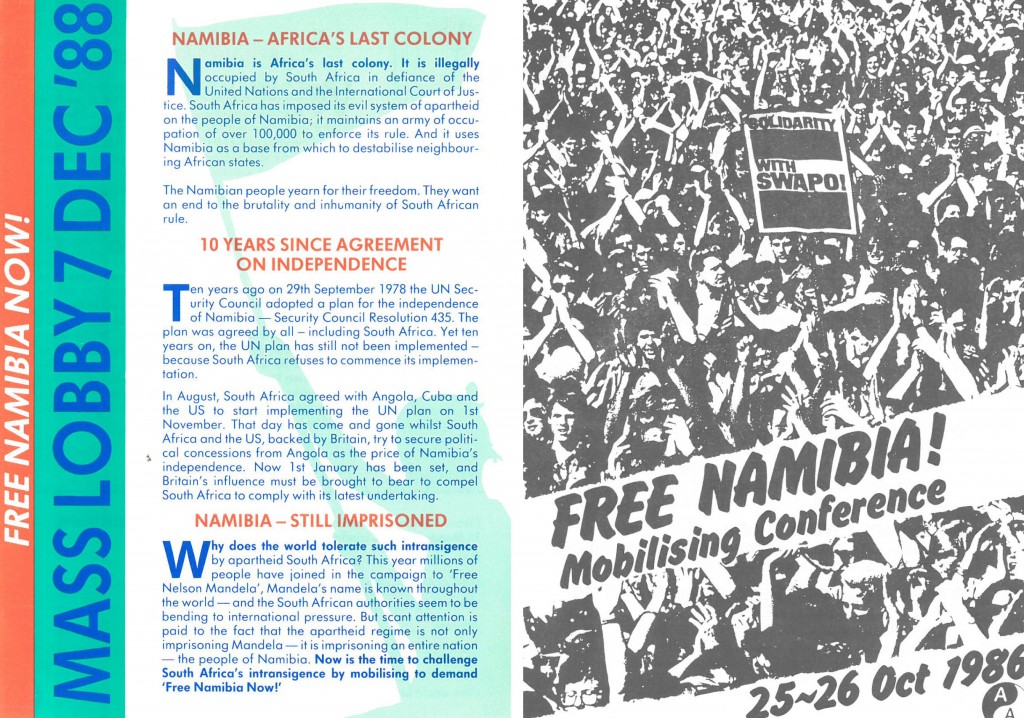Eight months ago when I first began working on the Scottish Committee of the Anti-Apartheid Movement Archive I thought that I would largely be working on papers that had either a focus on South Africa, or Scotland and the UK’s efforts to draw attention to and end the apartheid regime. Naturally, these papers did form an extensive part of the collection, however I found a significant amount of files and papers related to Namibia and a group of countries that formed the Frontline States which bordered, or were in close proximity, to South Africa, these included Angola, Botswana, Lesotho, Malawi, Mozambique, Swaziland, Tanzania, Zambia and Zimbabwe. These countries all played their part in helping to support the global anti-apartheid movement and bring an end to the terrible regime.
Namibia
Two of the main causes that contributed to Namibia’s involvement in the dissolution apartheid were a long period of South African rule that included an enforced apartheid regime and the exporting of Namibian uranium to Britain.
In the years following the First World War South Africa ruled Namibia (then know as South-West Africa) under a League of Nations mandate, which ran until 1966 when it was revoked by the UN General Assembly. The South West Africa People’s Organisation (SWAPO) was set up in an effort to win Namibian independence after South Africa failed to withdraw and continued to impose it’s apartheid regime on the country. The People’s Liberation Army of Namibia (PLAN) was an armed wing of SWAPO that fought in the ensuing Namibian War of Independence. On 21 March 1990 Namibia was finally recognised as an independent country, which heralded great change in the neighboring countries.
Uranium that was imported to Britain from Namibia during the 1970s and 80s from Rossing mine, run by Rio Tinto Zinc was in contravention of a UN resolution. The Anti-Apartheid Movement, working with the Haslemere Group and the Namibia Support Committee set up pressure group the Campaign Against the Namibian Uranium Contract (CANUC) to campaign for Britain to stop importing the material. The Anti-Apartheid Movement and its Scottish counterpart were already encouraging the boycott of South African consumer goods, as well as investments, and the Namibian cause only helped to highlight the injustices that were occurring in Southern Africa.
The Frontline States
The Frontline States (FLS) were formed as an alliance of neighbouring countries to South Africa during the 1970s, and later joined by Zimbabwe in 1980 in an effort to support the dissolution of apartheid and work towards a democratic country. They co-ordinated their responses formulating a uniform policy towards the apartheid government and the liberation movement. Their support was invaluable in the struggle but due to their proximity to South Africa it was difficult to enforce sanctions, as all FLS were economically tied to the country. Equally South African military power was far greater than that of the FLS which was often taken advantage of to affect the actions of the neighbouring countries. By far the greatest contribution of the FLS to the abolition of apartheid was forcing South Africa to open up dialogue with Liberation leaders in wake of the Southern African Development Coordination Conference (SADCC).
In the archives we have a lot of fascinating material on both Namibia and the Frontline States. It can be easy to overlook the contribution that these neighbouring countries made to help end apartheid, when considering the contribution that our own country made to the cause. However, it shouldn’t be forgotten by us and is another important example from the collection of why it is important to think globally as well as locally.
Julia Wylie, Project Archivist
